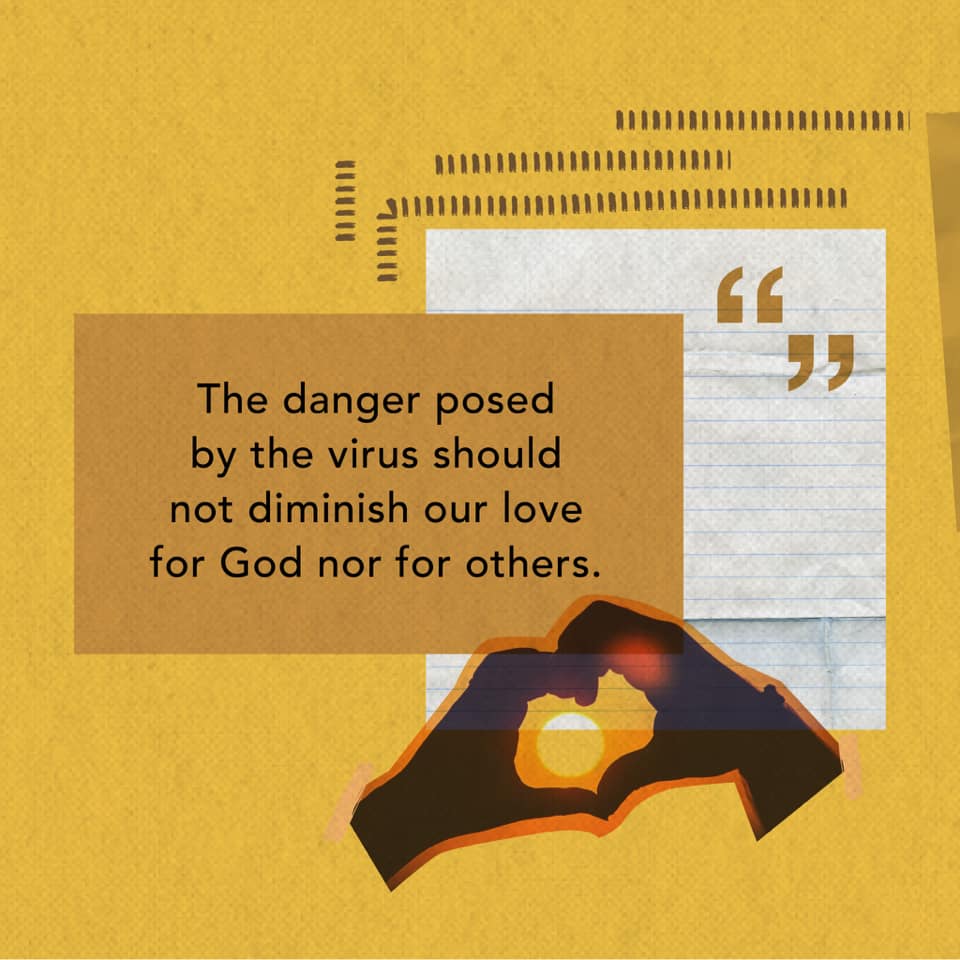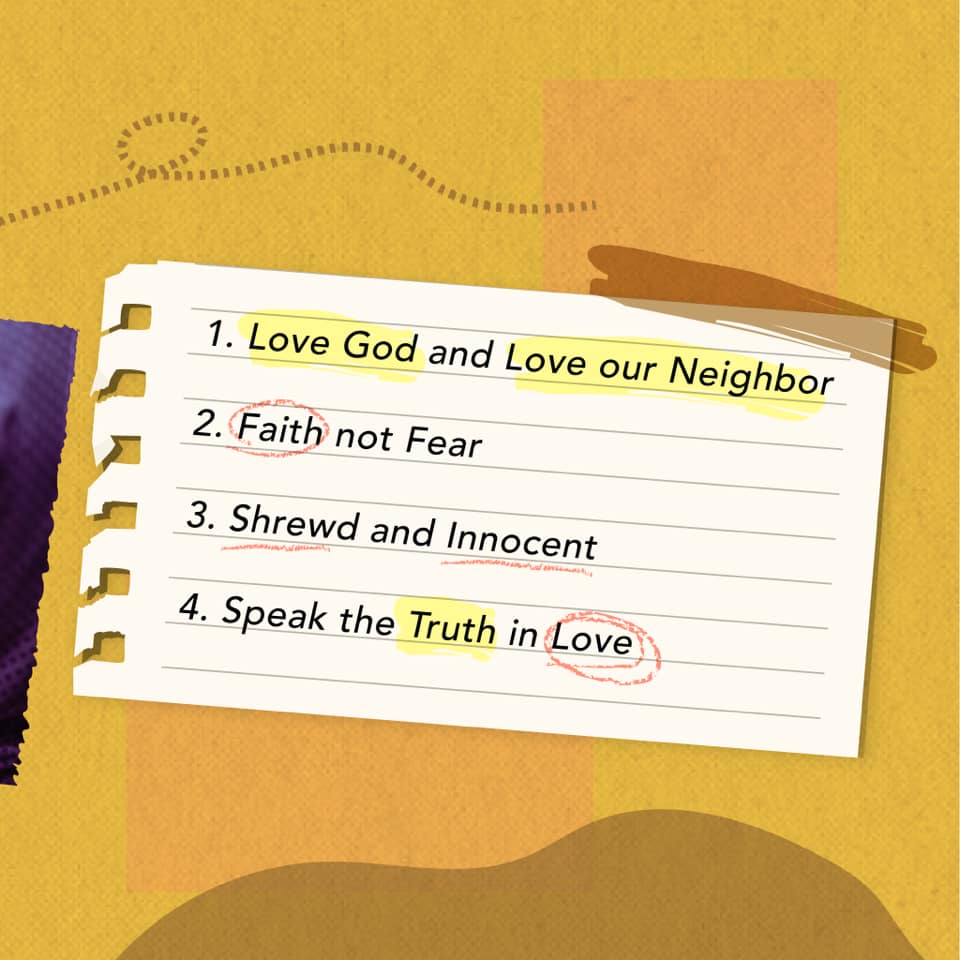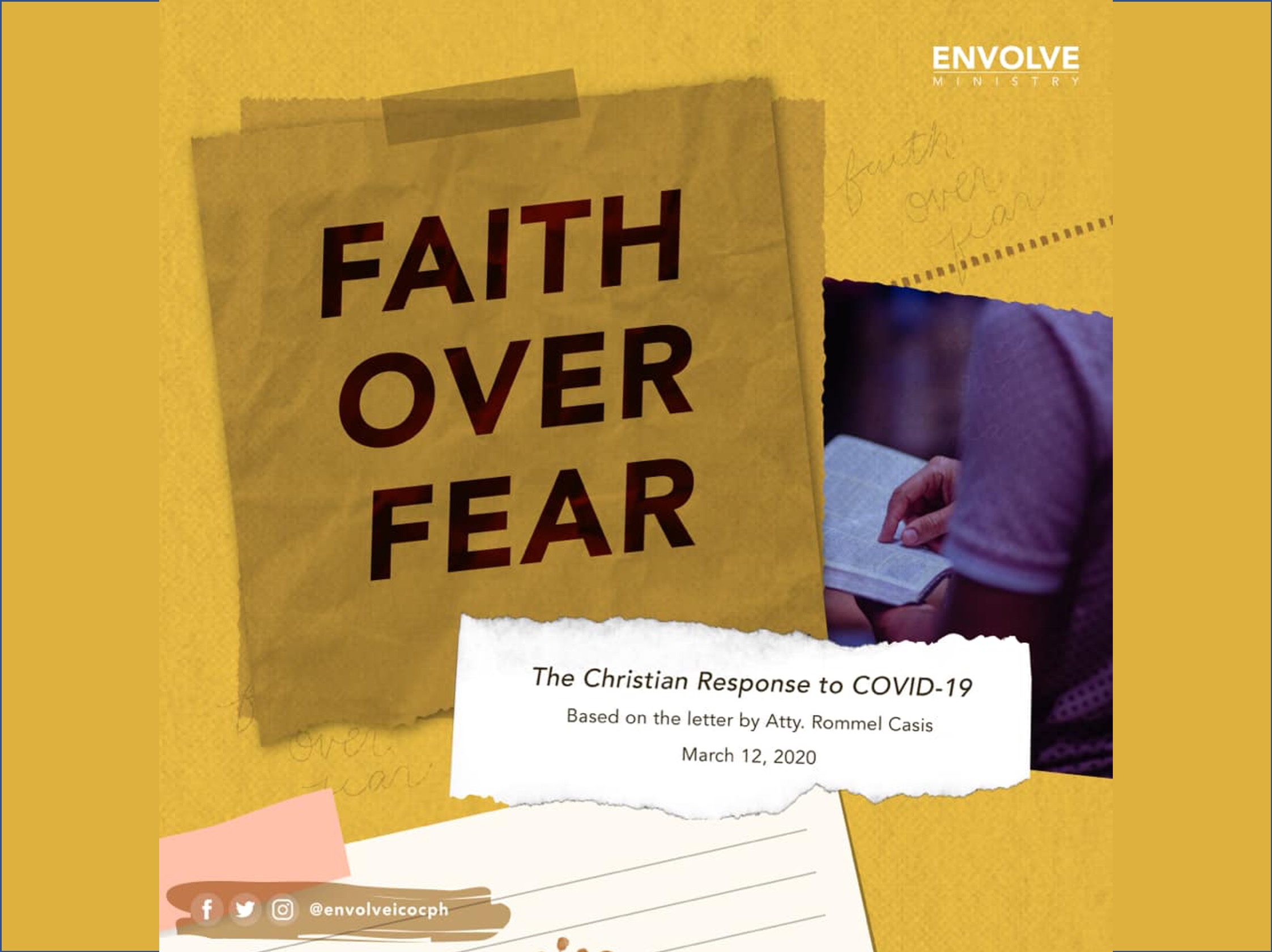Faith Over Fear: The Christian Response to Covid-19
We now all know about the dangers posed by a new virus causing a disease now known as Covid-19. Because of the risk of contracting the disease, we have been asked to behave differently. Traveling and participating in large group activities has been prohibited. Classes and work have been suspended. People are advised to stay at home. Lockdowns have been enforced. Even church activities have not been spared from the impacts of the virus.
But just like any problem, Christians must respond in accordance with God’s will. Our response is still subject to the Lordship of Jesus. Jesus is Lord of all and that includes our response to deadly diseases. Like all things, our reaction to this crisis must be subject to the sovereignty of God and guided by Biblical truth. This disease even in its most insidious form, does not exempt us from obeying God and being righteous in our ways. We do not stop being a disciple of Jesus even in the face of a pandemic. To do so would be to deny the Lordship of Christ and an abandonment of our faith.
But the dangers are real. More and more people are getting infected. If we are not careful, we or our loved ones may die. So, the situation is quite serious.
The question is, how does God want us to respond to the situation caused by this virus? As always, we should seek our answer from the scriptures.
Love God and Love Our Neighbor

We know that loving God and loving our neighbor is the first and second greatest commandments. While the first is more important than the second, we cannot obey the first if we disobey the second. As 1 John 4:20-21 says:
Whoever claims to love God yet hates a brother or sister is a liar. For whoever does not love their brother and sister, whom they have seen, cannot love God, whom they have not seen. And he has given us this command: Anyone who loves God must also love their brother and sister.
These verses teach us that the danger posed by the virus should not diminish our love for God nor our love for others. This means that despite the virus, we should continue to love God with all our heart, soul, mind and strength. During these times, we should keep our focus on loving God. In fact, these are times we should devote more time to prayer and meditating on the Bible. More than hand sanitizers, masks and disinfectants, we need more faith, hope and love. God is the only one who could provide us with these basic necessities for life. God offers an unlimited supply of these and so we should seek him always and even more now.
The second greatest commandment to love our neighbor also continues despite the challenging circumstances. We must reject all forms of hatred. Neither should we neglect one another just because we can’t meet in person. While physically we may need to be separate, in our hearts we must continue to be united and loving toward each other.
Paul in explaining the many facets of love in 1 Corinthians 13 said that in verse 7 that love “always protects, always trusts, always hopes, always perseveres.” Being loving means being protective of others. We need to help each other protect our physical and spiritual health. This means we should not act in ways that may hurt others. In terms of physical health this is where our efforts not to spread the virus (e.g. frequent hand washing, wearing masks or social distancing etc.) comes into play. Many of us have become zealous in this regard and rightly so. But we should also be as zealous for protecting each other’s spiritual health. We must make sure that the measures we undertake to protect our physical health do not at the same time destroy our spiritual health. While quarantine may be necessary, isolating oneself or others from the fellowship or the discipling they need, can offer far greater dangers than the virus. While staying away from meetings of the body when one feels symptoms may be the responsible thing to do in many cases, we should make sure we stay in contact and encourage one another daily even if not in person or through use of technology.
But someone might ask, if we choose to meet online instead of in person, does that not show lack of conviction in meetings of the body? No, it is not when it is done out of the conviction that loving one another means protecting each other. The command is to not give up meeting together. That we choose to meet online out of love for each is actually obedience to that command.

Faith Not Fear
The most common reaction to Covid-19 is that of fear. It is true that people have died from the virus. But this does not mean we should give in to fear of death. Hebrews 2:15 teaches us that Jesus died so that we can be free from the “slavery by [our] fear of death.” In the first place why should Christians fear death? We should have the same attitude as Paul in Philippians 1:21 where he says, “[f]or to me, to live is Christ and to die is gain.”
Christians should not be afraid to die.
We sabotage the gospel when we who say we are saved tremble in fear of death as if we were one of the lost. In Philippians 1:27, Paul exhorts that “[w]hatever happens, [we should] conduct [ourselves] in a manner worthy of the gospel of Christ.” We are not acting in a manner worthy of the gospel when we act no different from those who have no God. The gospel is a message of salvation so we should as in manner consistent with the fact that we are saved.
This virus situation can be an opportunity for us to share our faith. We can display the faith of the saved in the midst of worldly fear around us. We have the chance to share the same conviction as David in Psalm 23:4 where he said:
Even though I walk through the valley of the shadow of death,
I will fear no evil, for you are with me; your rod and your staff, they comfort me.
We can be confident even in the midst of death and disease because God is with us. When we act in this way, we are sharing our faith. But if we cower in fear of death just like everyone else, where is our testimony?
Shrewd and innocent
In Matthew 10:16, Jesus says: “I am sending you out like sheep among wolves. Therefore, be as shrewd as snakes and as innocent as doves.” Disciples of Jesus are like “sheep among wolves.” There are dangers around them so they need to be wise and cautious. But disciples must also be careful that in their desire to protect themselves they do not become guilty of sin. While the health risk posed by the virus is very real, the risk of unrighteousness is also very real and no less important. We must communicate and act with gentleness and kindness. Our desire to be safe does not give us an excuse to be insensitive. Our shrewdness in dealing with the danger should not result in unrighteousness.
Speak the truth in love
Paul encouraged Christians to speak the truth in love (Eph 4:15). Furthermore, he reminded Timothy that the church is supposed to be the pillar and foundation of the truth (1 Ti 3:15). In the age of social media, spreading false information is already a problem even among disciples. The need to correct online behavior becomes even more crucial in the context of the virus. Every member of the church must be careful about information they share. We should not share information if not verifiable and coming from credible sources. The fear that information “might be true” is not an excuse to share unverified information. Christians must not be the source of false or misleading information even if done unintentionally. The spread of false information can be more dangerous than the spread of the virus itself.
There are other principles from the Scriptures we can apply during these trying times. These are only a few. May we all find guidance from God through the scriptures and prayer and walk in faith in these times of uncertainty.

